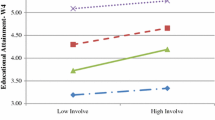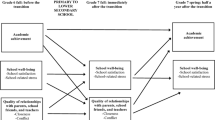Abstract
Children from low-income families are at greater risk for poor social–emotional development and physical health and may be in need of intervention. This study examined the extent to which the Positive Action (PA) preschool lessons improved low-income children’s social–emotional competence and health behaviors. Mixed findings emerged with regard to whether the lessons facilitated growth in child outcomes. Results showed positive effects of PA on children’s directly assessed social problem solving skills and their parent-rated social–emotional competence and health behaviors. Unexpectedly, program effects on teacher ratings of social–emotional competence were in the opposite direction. These findings provide preliminary evidence that PA may be effective in promoting positive social–emotional and health behavior outcomes for children, particularly when outcomes are assessed directly and by parents.

Similar content being viewed by others
References
Aber, J. L., Brown, J. L., Jones, S., & Samples, F. (1995). Adapting measures of children’s beliefs, attributions and skills for use in the evaluation of violence prevention projects. New York: National Center for Children in Poverty, Columbia University.
Allred, C. G. (2009). Prekindergarten instructor’s manual. Twin Falls, ID: Positive Action, Inc.
Basch, C. E. (2011). Breakfast and the achievement gap among urban minority youth. Journal of School Health, 81, 635–640.
Bavarian, N., Lewis, K. M., Acock, A., DuBois, D. L., Yan, Z., Vuchinich, S., … Flay, B. R. (2016). Effects of a school-based social–emotional and character development program on health behaviors: A matched-pair, cluster-randomized controlled trial. The Journal of Primary Prevention. doi:10.1007/s10935-016-0417-8.
Benton, D. (2004). Role of parents in the determination of the food preferences of children and the development of obesity. International Journal of Obesity, 28, 858–869. doi:10.1038/sj.ijo.0802532.
Bierman, K. L., Nix, R. L., Greenberg, M. T., Blair, C., & Domitrovich, C. E. (2008). Executive functions and school readiness intervention: Impact, moderation, and mediation in the Head Start REDI program. Developmental Psychopathology, 20, 821–843. doi:10.1017/S0954579408000394.
Birch, L. L., & Fisher, J. O. (1998). Development of eating behaviors among children and adolescents. Pediatrics, 101, 539–549.
Bradley, R. H., & Corwyn, R. F. (2002). Socioeconomic status and child development. Annual Review of Psychology, 53, 371–399.
Dauenhauer, B., Keating, X., & Lambdin, D. (2016). Effects of a three-tiered intervention model on physical activity and fitness levels of elementary school children. The Journal of Primary Prevention, 37(4), 313–327. doi:10.1007/s10935-016-0430-y.
Denham, S. A. (2006). Social-emotional competence as support for school readiness: What is it and how do we assess it? Early Education and Development, 17, 57–89. doi:10.1207/s15566935eed1701_4.
Denham, S. A., Kimberly, A. B., DeMulder, E., Levitas, J., Sawyer, K., Auerbach-Major, A., & Queenan, P. (2003). Preschool emotional competence: Pathway to social competence? Child Development, 74, 238–256. doi:10.1111/1467-8624.00533.
Diamond, A., & Lee, K. (2011). Interventions shown to aid executive function development in children 4 to 12 years old. Science, 333, 959–964. doi:10.1126/science.1204529.
Duckworth, A. L., & Yeager, D. S. (2015). Measurement matters: Assessing personal qualities other than cognitive ability for educational purposes. Educational Researcher, 44, 237–251. doi:10.3102/0013189X15584327.
Durlak, J. A., Weissberg, R. P., Dymnicki, A. B., Taylor, R. D., & Schellinger, K. B. (2011). The impact of enhancing students’ social and emotional learning: A meta-analysis of school-based universal interventions. Child Development, 82, 405–432. doi:10.1111/j.1467-8624.2010.01564.x.
Fedewa, A. L., & Ahn, S. (2011). The effects of physical activity and physical fitness on children’s achievement and cognitive outcomes: A meta-analysis. Research Quarterly for Exercise & Sport, 82, 521–535. doi:10.1080/02701367.2011.10599785.
Flay, B. R., & Allred, C. G. (2010). The positive action program: Improving academics, behavior and character by teaching comprehensive skills for successful learning and living. In T. Lovat & R. Toomey (Eds.), International handbook on values education and student well-being (pp. 471–501). Dortrecht: Springer.
Flay, B. R., Snyder, F., & Petraitis, J. (2009). The theory of triadic influence. In R. J. DiClemente, M. C. Kegler & R. A. Crosby (Eds.), Emerging theories in health promotion practice and research (2nd ed., pp. 451–510). San Francisco: Jossey-Bass.
Florence, M. D., Asbridge, M., & Veugelers, P. J. (2008). Diet quality and academic performance. Journal of School Health, 78, 209–215. doi:10.1111/j.1746-1561.2008.00288.x.
Gresham F. M., & Elliott S. N. (2008). The social skills improvement system rating scales. San Antonio, TX: Pearson.
Hughes, S. O., Power, T. G., O’Connor, T. M., & Fisher, J. O. (2015). Executive functioning, emotion regulation, eating self-regulation, and weight status in low-income preschool children: How do they relate? Appetite, 89, 1–9. doi:10.1016/j.appet.2015.01.009.
Jones, S. M., & Bouffard, S. M. (2012). Social and emotional learning in schools: From programs to strategies. Society for Research in Child Development Social Policy Report, 26, 1–33.
Jones, S. M., Zaslow, M., Darling-Churchill, K. E., & Halle, T. G. (2016). Assessing early childhood social and emotional development: Key conceptual and measurement issues. Journal of Applied Developmental Psychology. doi:10.1016/j.appdev.2016.02.008.
Joseph, L. S., Gorin, A. A., Mobley, S. L., & Mobley, A. R. (2015). Impact of a short-term nutrition education child care pilot intervention on preschool children’s intention to choose healthy snacks and actual snack choices. Childhood Obesity, 11, 513–520. doi:10.1089/chi.2015.0028.
Ladd, G. W. (1999). Peer relationships and social competence during early and middle childhood. Annual Review of Psychology, 50, 333–359. doi:10.1146/annurev.psych.50.1.333.
Laursen, B., & Pursell, G. (2009). Conflict in peer relationships. In K. H. Rubin, W. M. Bukowski & B. Laursen (Eds.), Handbook of peer interactions, relationships, and groups (pp. 267–286). New York: The Guilford Press.
Lewis, K. M., DuBois, D. L., Bavarian, N., Acock, A., Silverthorn, N., Day, J., … Flay, B. (2013). Effects of positive action on the emotional health of urban youth: A cluster-randomized trial. Journal of Adolescent Health, 53, 706–711. doi:10.1016/j.jadohealth.2013.06.012.
Lewis, K. M., Vuchinich, S., Ji, P., DuBois, D. L., Acock, A., Bavarian, N. … Flay, B. R. (2016). Effects of the positive action program on indicators of positive youth development among urban youth. Applied Developmental Science, 20, 16–28. doi:10.1080/10888691.2015.1039123.
Ling, S. T., & Barnett, D. W. (2013). Increasing preschool student engagement during group learning activities using a group contingency. Topics in Early Childhood Special Education, 33, 186–196. doi:10.1177/0271121413484595.
London, R. A., & Castrechini, S. (2011). A longitudinal examination of the link between youth physical fitness and academic achievement. Journal of School Health, 81, 400–408.
Luszczynska, A., & Schwarzer, R. (2005). Social cognitive theory. In M. Conner & P. Norman (Eds.), Predicting health behavior (2nd ed., pp. 127–169). Buckingham: Open University Press.
Nix, R. L., Bierman, K. L., Heinrichs, B. S., Gest, S. D., Welsh, J. A., & Domitrovich, C. E. (2016). The randomized controlled trial of Head Start REDI: Sustained effects on developmental trajectories of social–emotional functioning. Journal of Consulting and Clinical Psychology, 84, 310–322. doi:10.1037/a0039937.
Pettigrew, J., Graham, J. W., Miller-Day, M., Hecht, M. L., Krieger, J. L., & Shin, Y. J. (2015). Adherence and delivery: Implementation quality and program outcomes for the seventh-grade keeping’ it REAL program. Prevention Science, 16, 90–99. doi:10.1007/s11121-014-0459-1.
Qi, C. H., & Kaiser, A. P. (2003). Behavior problems of preschool children from low-income families: A review of the literature. Topics in Early Childhood Special Education, 23, 188–216. doi:10.1177/02711214030230040201.
Schmitt, S. A., Flay, B. R., & Lewis, K. (2014). A pilot evaluation of the Positive Action prekindergarten lessons. Early Child Development and Care, 184, 1978–1991. doi:10.1080/03004430.2014.903942.
Shadish, W. R., Cook, T. D., & Campbell, D. T. (2002). Experimental and quasi-experimental designs for generalized causal inference. Boston: Houghton Mifflin Company.
Tandon, P., Thompson, S., Moran, L., & Lengua, L. (2015). Body mass index mediates the effects of low income on preschool children’s executive control, with implications for behavior and academics. Childhood Obesity, 11(5), 569–576.
U.S. Census Bureau (2011). Child poverty in the United States 2009 and 2010: Selected race groups and Hispanic origin. American Community Survey Briefs. Retrieved from http://www.census.gov/prod/2011pubs/acsbr10-05.pdf.
West, M. R., Kraft, M. A., Finn, A. S., Martin, R. E., Duckworth, A. L., & Gabrieli, J. D. E. (2015). Promise and paradox: Measuring students’ non-cognitive skills and the impact of schooling. Educational Evaluation and Policy Analysis, 38, 148–170. doi:10.3102/0162373715597298.
Witt, K. E., & Dunn, C. (2012). Increasing fruit and vegetable consumption among preschoolers: Evaluation of color me healthy. Journal of Nutrition Education and Behavior, 44(2), 107–113. doi:10.1016/j.jneb.2011.01.002.
Wolfenden, L., Wyse, R. J., Britton, B. I., Campbell, K. J., Hodder, R. K., Stacey, F. G., McElduff, P., & James, E. L. (2012). Interventions for increasing fruit and vegetable consumption in children aged 5 years and under. Cochrane Database of Systematic Reviews, 11, CD008552.
Woodfield, L., Duncan, M., Al-Nakeeb, Y., Nevill, A., & Jenkins, C. (2002). Sex, ethnic, and socioeconomic differences in children’s physical activity. Pediatric Exercise Science, 14, 277–285.
Acknowledgements
This study was supported by a grant from Indiana Clinical and Translational Sciences Institute Pediatric Project Development Team (PDT 543) and a grant from the U.S. Department of Education Institute for Education Sciences (grant # R305B120013).
Author information
Authors and Affiliations
Corresponding author
Ethics declarations
Conflict of interest
The authors declare that they have no conflict of interest.
Ethical Approval
All procedures performed in studies involving human participants were in accordance with the ethical standards of the institutional and/or national research committee and with the 1964 Helsinki declaration and its later amendments or comparable ethical standards.
Rights and permissions
About this article
Cite this article
Schmitt, S.A., Lewis, K.M., Duncan, R.J. et al. The Effects of Positive Action on Preschoolers’ Social–Emotional Competence and Health Behaviors. Early Childhood Educ J 46, 141–151 (2018). https://doi.org/10.1007/s10643-017-0851-0
Published:
Issue Date:
DOI: https://doi.org/10.1007/s10643-017-0851-0




